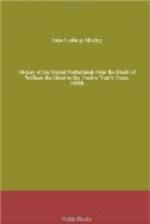A suggestion which had been made by these diplomatists to prolong the actually existing armistice into a truce of seven years, a step which they professed themselves willing to take upon their own responsibility, had been scornfully rejected by the States. It was already carrying them far enough away, they said, to take them away from a peace to a truce, which was something far less secure than a peace, but the continuance of this floating, uncertain armistice would be the most dangerous insecurity of all. This would be going from firm land to slippery ice, and from slippery ice into the water. By such a process, they would have neither war nor peace—neither liberty of government nor freedom of commerce—and they unanimously refused to listen to any such schemes.
During the fortnight which followed this provisional consent of the States, the prince redoubled his efforts to counteract the Barneveld party.
He was determined, so far as in him lay, that the United Netherlands should never fall back under the dominion of Spain. He had long maintained the impossibility of effecting their thorough independence except by continuing the war, and had only with reluctance acquiesced in the arguments of the French ambassadors in favour of peace negotiations. As to the truce, he vehemently assured those envoys that it was but a trap. How could the Netherlanders know who their friends might be when the truce should have expired, and under what unfavourable auspices they might not be compelled to resume hostilities?
As if he had been actually present at the council boards in Madrid and Valladolid, or had been reading the secret letters of Friar John to Spinola, he affirmed that the only object of Spain was to recruit her strength and improve her finances, now entirely exhausted. He believed, on the other hand, that the people of the provinces, after they should have once become accustomed to repose; would shrink from exchanging their lucrative pursuits for war, and would prefer to fall back under the yoke of Spain. During the truce they would object to the furnishing of necessary contributions for garrison expenses, and the result would be that the most important cities and strongholds, especially those on the frontier, which were mainly inhabited by Catholics, would become insecure. Being hostile to a Government which only controlled them by force, they would with difficulty be kept in check by diminished garrisons, unless they should obtain liberty of Catholic worship.
It is a dismal proof of the inability of a leading mind, after half a century’s war, to comprehend the true lesson of the war—that toleration of the Roman religion seemed to Maurice an entirely inadmissible idea. The prince could not rise to the height on which his illustrious father had stood; and those about him, who encouraged him in his hostility to Catholicism, denounced Barneveld and Arminius as no better than traitors and atheists. In the eyes of the extreme party, the mighty war had been waged, not to liberate human thought, but to enforce predestination; and heretics to Calvinism were as offensive in their eyes as Jews and Saracens had ever been to Torquemada.




